Search the Special Collections and Archives Portal
Search Results
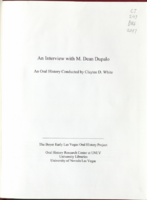
Transcript of interview with Martin Dean Dupalo by Claytee D. White, October 24, 2005
Date
2005-10-24
Archival Collection
Description
Martin Dean Dupalo was born February 20, 1967. His parents were Eva Auge, a German citizen, and Milton Dupalo. Martin shares many stories and anecdotes concerning his family background, his father's 21 year military career, his mother's tribulations in WWII Berlin, and the many sites the family visited all over the world. Martin gives a wealth of details regarding Las Vegas and UNLV in the seventies and eighties. He lists the schools he attended in Clark County and recalls some of the friends and professors his father knew while attending UNLV. Martin graduated from Eldorado High in 1985, attended UNLV, and was selected for a Truman Congressional Scholarship at Carnegie Mellon in Pittsburgh, Pennsylvania. He describes the house and surrounding area in which he and his father and brother, Michael Dean, lived. He also includes comments and anecdotes regarding entertainment in the Vegas Valley. After a stint as a fire fighter, four years in the Air Force and Air Force Reserve, and a brief marriage, Martin began teaching at UNLV in 2003. He discusses race relations as he has experienced them in his family, the military, Las Vegas, and at UNLV. His closing comments are in regard to war, world population, and the possibility of peace.
Text
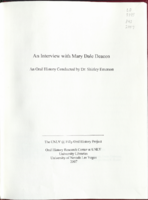
Transcript of interview with Mary Dale Deacon by Shirley Emerson, June 21, 2006
Date
2006-06-21
Archival Collection
Description
Mary Dale Deacon was born in El Paso, Texas, and grew up in Las Cruces, New Mexico. Her father was a Presbyterian minister who had been called to Las Cruces before she was born. She and her older sister and younger brother loved to read and spent a great deal of time in the public library. They all attended grade school and high school in Las Cruces. Mary earned her undergraduate degree at the University of New Mexico in Albuquerque, and also took some graduate courses in history. When she transferred to the University of Denver to work on her librarian degree, she was able to use the history credits as her minor. After graduating, she interviewed for a position at the University of British Columbia, requesting government publications as her field of interest, and worked there for the next three years. During this time, she met and married a Canadian who was also a librarian. In 1969, Mary and her husband interviewed at the University of Arizona library, and her husband received a job offer. Mary became a research associate on a book which was published, and also had a research paper published. She was eventually hired as head of government documents at the university, and later took a position as assistant librarian in charge of public services. Mary was recommended for director of libraries at UNLV in 1982. She accepted the job, with all its many challenges, and worked there until she retired in 1992. During those ten years, she was responsible for increasing the book collection and the funding, changing to an integrated automated program, instigating staff development and developing new positions, and finally getting a new library as the number one building project for the university system.
Text

Interview with Sandie A. Medina, January 25, 2004
Date
2004-01-25
Archival Collection
Description
Narrator affiliation: Administrator, Reynolds Electrical and Engineering Company (REECo); Project Manager, NTS Medical Surveillance Project Office
Text

Transcript of interview with Harvey Allen by Claytee D. White, December 5, 2006
Date
2006-12-05
Archival Collection
Description
Harvey Allen grew up poor in Philadelphia. After taking singing lessons at the Artie Singer Vocal School, he got jobs singing in night clubs up and down the east coast. He also took acting classes in New York and performed at the Copa Club. In the 1950s, he moved to Las Vegas and auditioned for Jack Entratter at the Sands Hotel and Casino where he performed with numerous entertainers including Lena Horne, Louis Armstrong, Tallulah Bankhead and Robert Merrill. Allen's accomplishments include attending and obtaining a degree in telecommunications and film from San Diego State and a Master's degree from UNLV. He worked for the American Society of Composer, Authors and Publishers. Harvey recalls working on a segregated strip and the opening of the first integrated casino in Las Vegas, The Moulin Rouge. Twice he moved from Las Vegas but always returned. He implemented National Reading Week for the State Department of Education and was the emcee for Sunrise Hospital Cancer Survivors Week. In addition to hosting a popular talk show on KDON radio, he hosted the "All-Nighters Club Convention", taught classes at UNLV tor 31 years and wrote a column in Maturity Today. Now Harvey is at a different stage of his life. He and his wife are active in running their public relations agency, enjoying their garden, taking great photographs and spending time together in their fabulous home in Anthem.
Text
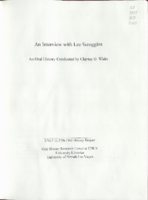
Transcript of interview with Lee Scroggins by Claytee D. White, February 27, 2009
Date
2009-02-27
Archival Collection
Description
From a Montana childhood filled with memories of sub-zero winters to a whirlwind courtship and wedding to her husband of over three decades, Lee Scroggins brought an energy to all her administrative positions at UNLV. Lee and her family moved to Las Vegas in March 1980. Within a couple of months she was working at UNLV and except for a brief hiatus in the late 1980s she remained at the university until her retirement in 2009. She gives an account of her journey through the office staff levels she held. It began with a brief stint in the Education department (you couldn't rise a level until you had six months in one position); took her to the Business and Economics departments; the 1980s. After her hiatus from 1985 to 1988, she returned to UNLV to work in the Psychology department and eventually to the library. Her interview traverses the evolution of the administrative worker from a time without technologies that became the common tools. It was an era without many copy machines, no Xerox, or computers. In addition, Lee touches upon procedural changes that were inevitable as the university grew In retirement, Lee plans to "call her own shots" and enjoy life.
Text
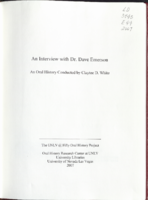
Transcript of interview with Dr. David Emerson by Claytee D. White, December 21, 2005
Date
2005-12-21
Archival Collection
Description
Dr. Dave Emerson was born in Littleton, Massachusetts. His father, a mining engineer, moved the family to Mexico twice, once when Dave was one year old and again when he was seven. In 1938, his father retired to work on his apple orchard in Littleton. Dave helped with pruning, spraying and dusting for insects, and hauling apples to the cider mill. Dr. Emerson graduated from high school in Littleton in 1945 and joined the army. Because he was only 17, the army sent him to Norwich University in Vermont until he turned 18. He then went on active duty until December, 1947. After he mustered out, Dartmouth College accepted his credits and he completed courses through his junior year. He was then called back to active duty in the Korean conflict, and was assigned to the Army Chemical Center in Maryland. After his army stint, Dr. Emerson worked a summer for Dow Chemical as a research engineer, and then returned to Michigan to pursue a Master's degree. He met and married his wife during this time. After completing his doctorate, Dave went to work for Shell Oil Company. Dave spent six years with Shell and decided to turn to teaching. He took a job at a branch of the University of Michigan. He worked there 17 years, doing research, teaching, and even spending a little time as chairman of the Division of Art, Sciences, and Letters. He was then notified of an opening at UNLV for dean of the College of Science, Math, and Engineering. In 1981, Dr. Emerson and his wife moved to Las Vegas, and he began teaching chemistry classes. He was instrumental in building up the engineering department through distance education for students who needed credits in math, computer skills, or electrical engineering. He also helped put together and sell the idea of a strong engineering school at UNLV, and then worked to gain accreditation for civil, mechanical, electrical and other areas of engineering. After retiring in 1998, Dr. Emerson worked on the self-study for the year 2000 accreditation. He still does research at UNLV on a volunteer basis. He and his wife continue to enjoy their home here in Vegas as well as their travels around the country.
Text

Transcript of interview with Herbert C. Wells by Dr. David Emerson, March 8, 2006
Date
2006-03-08
Archival Collection
Description
Herbert C. Wells is currently professor emeritus of civil and environmental engineering at UNLV, and is considered the father of engineering at the university. He was born in Omaha, Nebraska, in 1927, and spent the first four years of his life there. After his father was killed in a plane crash in 1931, his mother moved them out to Los Angeles to be near her husband's parents. They moved several times, but the goal was always to find good schools for Herb and his sister Herb received an outstanding junior high education at Trailfinders School for Boys, and then attended Woodrow Wilson Junior High School in ninth grade. He then was sent to the San Diego Army Navy Academy, where he completed high school in two years and graduated at age 16. He next enrolled at Pasadena Junior College, majoring first in chemistry and then in geology, and was drafted into the army at age 18. After the war, Herbert returned to Berkeley to finish his education. The GI bill helped him finish his master's degree. He then went to work for United Geophysical for two years, and following that, was hired at a mine in Climax, Colorado. He and his second wife moved to Las Vegas in 1957, where he began working for Titanium Metals. After a mere three weeks on the job, he met with Dr. Malcolm Graham from early UNLV, who asked Herb to teach surveying. Dr. Wells taught surveying for only one semester, but continued his association with the faculty at the university. He kept working at Titanium Metals, where he learned a lot of practical chemistry, but was laid off shortly thereafter. He then was offered a job with Blue Diamond Gypsum as a plant engineer and continued teaching on a part-time basis. He became a full-time instructor at the college in 1961. By 1967, Herbert had been appointed chairman of science, math, and engineering. He immediately put in a request for ten more teaching positions, which were ultimately filled. He also was instrumental in putting together a proposal for a graduate degree in physics, and of course was involved in ABET accreditation for engineering degrees.
Text
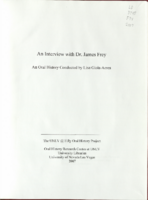
Transcript of interview with Dr. James Frey by Lisa Gioia-Acres, February 14, 2007
Date
2007-02-14
Archival Collection
Description
James Frey was born in Eureka, South Dakota, in 1941. His father worked in creamery and his mother was a registered nurse. When James was nine, the family,including his twin sister, relocated in Sioux Falls where his dad was plant manager for a dairy. He joined the YMCA in the fourth grade and ended up working for them until James attended Augustana College in Sioux Falls, graduating with a major in sociology and a minor in history. After graduation, he worked for three years at the YMCA in Sioux Falls as program director. He earned his master's degree in sociology at the University of Iowa in two years, and was hired at the YMCA in Whittier, California, where he worked for three years. While working in Whittier, James was offered a fellowship to Washington State University in Pullman. He committed to completing his doctorate in three years, and while still working on his dissertation began sending out applications. He sent one to UNLV and arrived in Las Vegas for an interview in 1974. James was hired as assistant professor of sociology at UNLV, and immediately established a survey center at the university. He also converted his dissertation into a book length manuscript and had it published, followed by other books and articles over the years. He conducted a survey on a very high-profile political race between Sheriff Ralph Lamb and his opponent, John McCarthy, which led to work for the State of Nevada, Yucca Mountain, and other entities. The survey program was eventually named the Cannon Center for Survey Research, after Senator Howard Cannon. In the course of his career, James was tenured, taught in London under a university sponsored program, spent a sabbatical in Washington, D.C., doing research, taught several classes, and served seven years as dean. He has detailed memories of the contributions of several university presidents, including Brock Dixon, Pat Goodall, Robert Maxson, Kenny Guinn, and Carol Harter. Today, Dr. James Frey and his wife of over thirty years, Carol, are both retired. He has made a smooth transition to president of his Rotary Club, Chairman of the Nevada Humanities group, and spectator at UNLV basketball and football games. He and his wife plan to stay in Las Vegas, close to their son and friends and neighbors they know and love.
Text
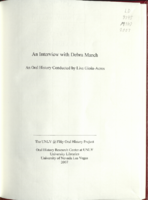
Transcript of interview with Debra March by Lisa Gioia-Acres, February 21, 2007
Date
2007-02-21
Archival Collection
Description
Debra March was born in Detroit, Michigan, in 1953. She is one of eight siblings all of whom attended Catholic school as children and eventually went on to professional careers. Debra's father worked for the city of Detroit, then moved to Las Vegas and was hired by the Clark County School District. He ultimately retired from there. Debra came to Las Vegas for the first time in 1973. Though she left for a couple of years, she eventually settled here and attended UNLV, earning an undergraduate degree in anthropology and biology. She then served a little over six years as a park ranger in Red Rock and Lake Tahoe. While at Lake Tahoe, Debra got her real estate license. She followed her husband to Ely, where she became a social worker. She ran the welfare division for rural Nevada in several counties and also kept her real estate license active. In 1989, Debra applied for the position of administrator of the Nevada Real Estate Division in Las Vegas. In her capacity as deputy administrator, Debra oversaw the activities of individuals who sold real estate. She and others in the division also monitored land sales time-shares, campground memberships and appraisers. She served in that position for four and a half years. In 1996, Debra was hired at UNLV. Many of the faculty members in the real estate school today are the ones who were there when she was hired, such as Mike Clauretie, Dick Hoyt, and Bob Aalberts. The Lied Institute, which she directs, supports an academic program in real estate and finance. It also conducts research, addresses community issues such as affordable housing, and offers adult and executive education programs. Debra is very involved in addressing many of the problems of housing and transportation that affect everyone living in the valley. In addition to heading the Lied Institute, she is also a Henderson planning commissioner, serves on the National Board of the American Planning Association, and is vice chairman of the board of the Urban Land Institute. She is proud of having established a real estate mentoring program that matches students with industry professionals, and she works closely with students to help them with their career goals.
Text
#69112: The University Libraries Oral History Research Center 10th Anniversary celebration and panel discussion of the local African American legal community on May 5, 2013, 2013 May 05
Level of Description
File
Archival Collection
University of Nevada, Las Vegas Creative Services Records (2010s)
To request this item in person:
Collection Number: PH-00388-05
Collection Name: University of Nevada, Las Vegas Creative Services Records (2010s)
Box/Folder: Digital File 00
Collection Name: University of Nevada, Las Vegas Creative Services Records (2010s)
Box/Folder: Digital File 00
Archival Component
Pagination
Refine my results
Content Type
Creator or Contributor
Subject
Archival Collection
Digital Project
Resource Type
Year
Material Type
Place
Language
Records Classification
